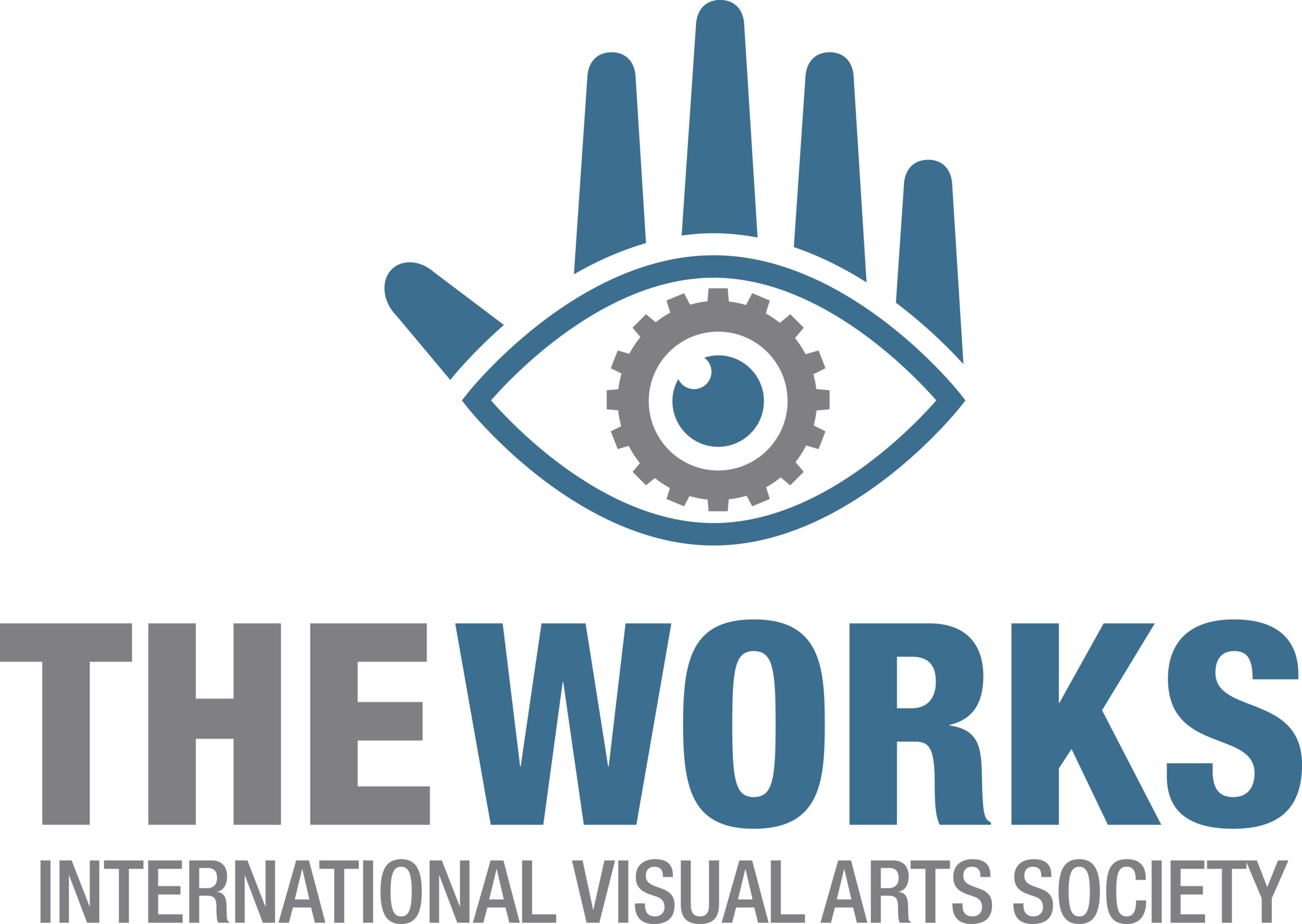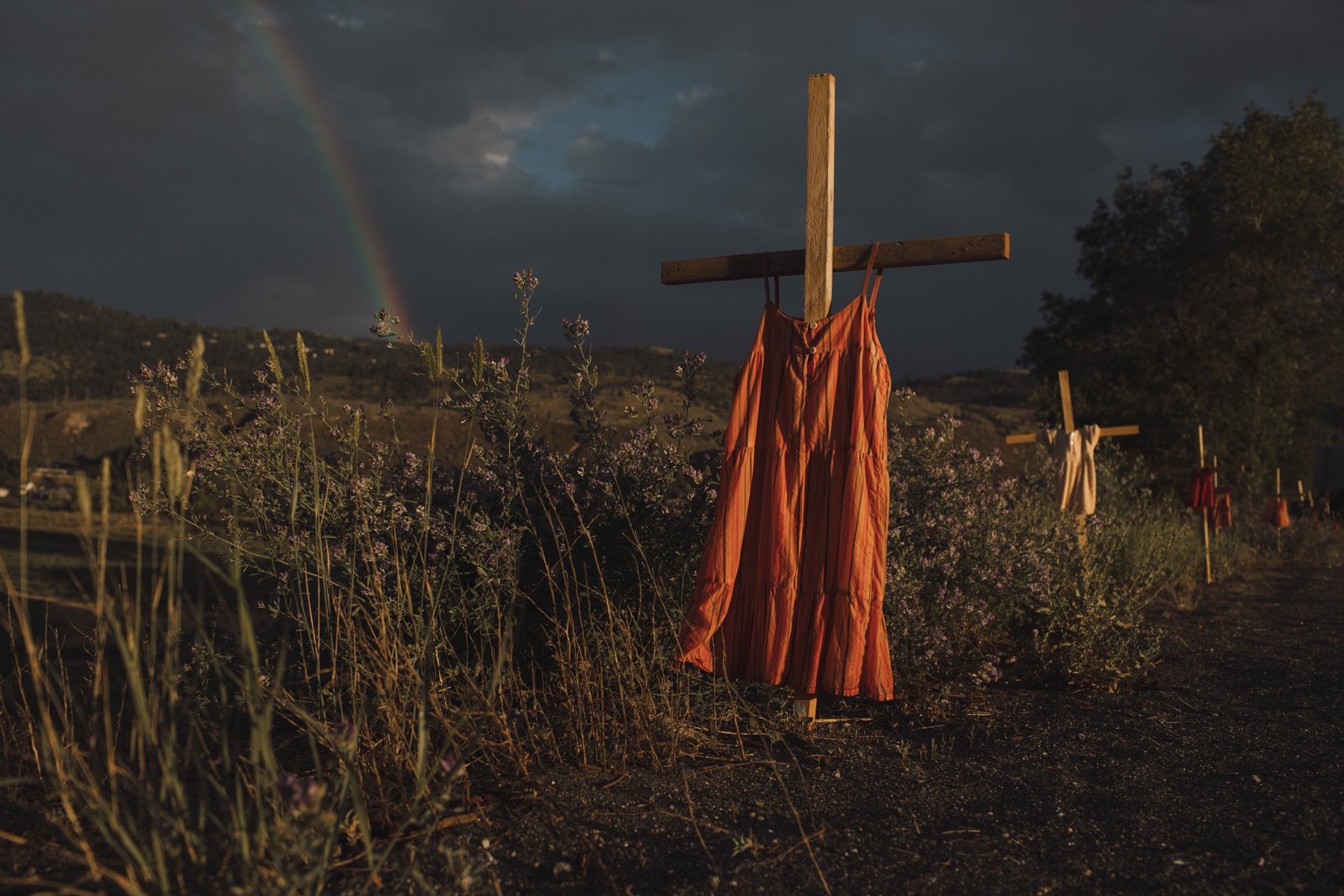Amber Bracken, Garry Gottfriedson, Snutetkwe Manuel
In your Canada
1000 and counting
artist statement
The discoveries of unmarked graves, starting in Secwépemc territory at Kamloops Indian Residential School last summer, renewed an ongoing collective reckoning of grief, accountability, resistance, nationhood, identity, guilt, and reclamation with cultural genocide.
It's a foundational wound in the relationship between Canada and Indigenous nations, but we don't all experience it the same way.
This work is a conversation between parallel experiences with Secwépemc intergenerational survivor and land defender, Snutetkwe Manuel, settler journalist, Amber Bracken, and Secwépemc knowledge keeper, survivor, teacher and poet, Garry Gottfriedson.
Snutetkwe envisioned the memorial installation to give form to the children who had been hidden for too long, and to honour them. The tiny figures, one after another, all the way along the road so that anyone driving past Kamloops Indian Residential School could not help but feel the impact of so many children, one after another, after another. The wooden structures appear to be crosses, a common grave marker and a symbol of the churches complicity in these losses. This is one layer of their meaning, but they are first intended to symbolize stars, each dressed with a new set of clothes lovingly gifted to the children for their journey home to the stars. Red clothes, rather than the orange that is typically associated with Residential Schools, emphasize the children's deaths as the first in a long line of missing and murdered Indigenous people in Canada, the consequences of systemic attempted erasure. Snutetkwe's community helped to dye cloth, sew, build, install and pray for each of approximately 50 structures—not quite 215 but still one, after another, after another, after another.
Last summer Amber drove from Edmonton to visit the Tk’emlúps te Secwépemc and Muskowekwan communities, documenting both at different stages of searching. The former was in grieving ceremonies while Muskowekwan had just begun to search. The long drive was dotted with many ribbons, teddy bears, shoes, candles, banners and remembrances for the children, but only the installation of child sized figures in red, one after the other after another, fully expressed the horror of so many unmarked graves and so many children who did not come home. These photographs, made with consent, depict the structures, ephemera, survivors, and outpouring of care for the children who did not come home, as well as Paspaschase descendent and archaeologist Dr. Kisha Supernant, who has been instrumental in many of the ground searches.
As a Kamloops resident, Garry lived with the installation over last summer, and again through the photograph. He has lived with the knowledge of unmarked graves for a lifetime. Garry's strong voice distills his resulting reflections into an unflinching poetic response. A year later, he underlines the children, one after another, after another, to 1000 and counting, who didn't come home and the systemic traumatization of Indigenous women. The other poems are selected from his life's work, built on his residential school experience.
Through physical experience, photographs and poetry, you are invited to honour, give voice and visibility to the thousands of Indigenous children who have been disappeared in colonial Canada.
Collaborators
A fourth generation Albertan based in Edmonton, Amber Bracken photographs primarily across western North America to represent the global issues in her own backyard. Amber's work explores intersections of race, environment, culture and colonization. She specializes in invested relationship based and historically contextualized storytelling that centres people in their own stories. Select recognition includes The World Press Photo of the Year, The Marty Forscher Fellowship, an ICP Infinity Award and the Pen Canada Ken Filkow Prize for contributions to free expression. @photobracken
Snutetkwe Manuel is a Secwépemc land defender, freedom birther and community leader. Currently living and working in Kamloops, in so called “British Columbia”, she is active in the Tiny House Warriors opposing the Trans Mountain pipeline through Secwépemc territory. Snutetkwe is part of a family of prominent Indigenous resistors, including former president of the National Indian Brotherhood, George Manuel, Indigenous land rights advocate, Arthur Manuel, and fellow Tiny House Warrior Kanahus Manuel. @snutetkwe
Garry Gottfriedson, from the Secwépemc nation, was born, raised and lives in Kamloops, B.C. Growing up in a ranching and rodeo family, he learned to work with horses and his passion for them continues to this day. Garry learned traditions and spirituality from his mother, grandparents and elders. A survivor of the Kamloops Indian Residential School, he is one of the first band members to earn a masters degree—a Masters of Education from Simon Fraser University. He has also studied Creative Writing at the Naropa Institute in Boulder, Colorado and the Secwepemc language at Chief Atahm Secwepemc Immersion School in Adams Lake. Select published works include In Honour of Our Grandmothers (Theytus, 1994); Glass Tepee (Thistledown, 2002, and nominated for First People’s Publishing Award 2004); Whiskey Bullets (Ronsdale, 2006, and Anskohk Aboriginal Award finalist); Skin Like Mine (Ronsdale, 2010, and shortlisted for Canadian Authors Association Award for Poetry); Chaos Inside Thunderstorms (Ronsdale, 2014); Deaf Heaven (Ronsdale, 2016); Clinging to Bone (Ronsdale, 2019); Bent Back Tongue (Caitlan Press, 2022).
Mental-Emotional Health Resources
Discussions around Indian Residential Schools may have a strong emotional and mental impact on you and those close to you. Here are some support options below that you and others can access.
Indian Residential Schools Resolution Health Support Program
Emotional, cultural and professional support services are available to Survivors and their families through a 24/7national crisis line: 1-866-925-4419
First Nations and Inuit Hope for Wellness 24/7 Help Line:
Call their toll-free helpline: 1-855-242-3310
Visit their website to chat and connect to a counsellor online. Support can be provided in English, French, Ojibway, Cree and Inuktitut.
Call 1-877-303-2642 (Toll free)
24 hour, 7 day a week confidential service that provides support, information and referrals to Albertans experiencing mental health concerns.
24-hours Distress Line - Canadian Mental Health Association
780-482-4357 (HELP)
The Distress Line provides confidential, non-judgmental and short-term crisis intervention, emotional support and resources to people in crisis or distress. We also support family, friends and caregivers of people in crisis.
Native Counselling Services of Alberta
Phone: 780- 451-4002
Open to any former Indian Residential School student and their family members regardless of their status or place of residence.
Resources for Mental Health - call 211
Call 211 or Text info to 211 or Go online to chat

